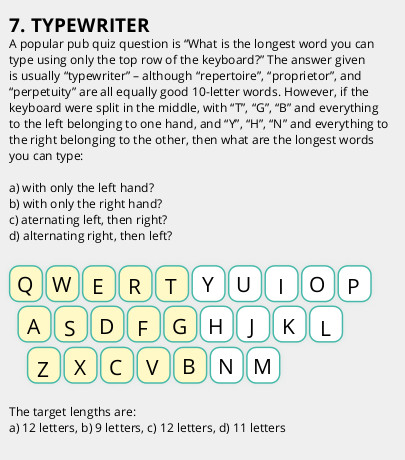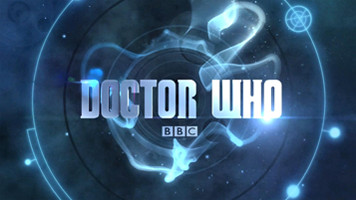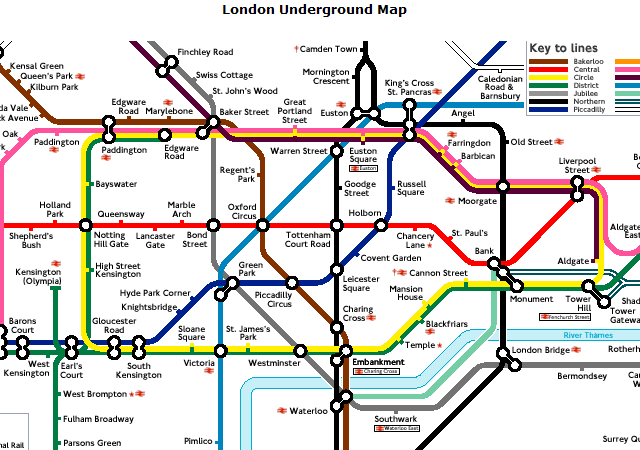In addition to the 16 quiz books under the pen name Mike Dugdale, and my work as a games developer, I have created numerous quizes and questions in various forms. I've also checked and re-checked other peoples assumptions using my general knowledge, research abilities, and pure brute force. (The case of the latter usually involves me writing an overly complicated computer program to check every possible answer!)
Some notably off-beat waypoints upon this journey have been:

| Many years ago I created some puzzles for the free newspaper, Metro. At the time David Bodycombe was commissioned to create the puzzles, and didn't accept them from the public. But he accept several of mine. Whether it was because they were good puzzles, or that we're fellow Mensans, or that he was desparate for some content, I'll never know. (We've still never met!) However, these were my first published puzzles, so I still enjoy looking at them. |

|
Some of the time I don't write questions, or invent puzzles, I just look for patterns in things. For example, I recently thought about words in alphabetical order. And instead of Google'ing the answer, I set about searching for them, myself. (With the aid of a computer.) In the process I found the word
"billowy", which beats the longest alphabetical found in Wikipedia (abhors, almost, begins, biopsy, chimps, and chintz) although not the eight-letter Aegilops (which is a proper noun.)
This has lead to magicians asking for things. Such as "I need two 5 letter words, where all the letters are used just once and not repeated in either word? Also the 5 letter blocks should only make up one word". I came up with the obvious examples ("truckloads", "nightclubs", and "wholegrain") along with some so obvious ones like "shoplifter" (ropes & filth), "planetoids" (opens & tidal), or "lifeguards" (sugar & field) The magician in question then added extra restrictions: a 15 letter word, where all the letters are unique, and are build from three 5 letter words, none of which have anagrams, and two can be combined into a 10 letter word. (Naturally the 10 letter word can't have anagrams, either!). Even as the compiler of anagram dictionary, this was a struggle. But I eventually found dermatoglyphics which builds to stylograph (Grasp & Hotly) with 'medic' left over. p.s. Would I sound smug if I mentioned the 14-letter "hydromagnetics" breaks down into "acronym & sighted"
|
 (IQ magazine, issue 4) |
One of the (many) computer tools I use to discover weird facts is awk. Back in 2005 I constructed:
( (egrep "^w.*" /usr/share/dict/words | awk '{ printf( "b%s\n",substr($0,2))}') && (egrep "^b.*" /usr/share/dict/words)) | sort -f | uniq -d -i
to produce Spoonerisms inspired by Natasha Kaplinski, who "wedded her banker." . I also constructed words produced by typing alternately on the left and right hand side of the keyboard (authenticity) and words using only the top and middle lines. Sometimes I like to use pronouns in my word lists, sometimes not. This is governed by whether I can find a more interesting answer, or not! For example, there are only 10 words in English which begin with 'i' and, when you remove it, still make a word. Obviously iPad, but less so are iRon, iMax, iKat & iSatin. p.s. the most frequent vowel which ends English words, is E. Only the consonants 'D' and 'S' appear more often. |

|
When I create quizzes for fun there's usually a trick to them. Moreso when I know the solvers have particular quirks! For this Dr Who quiz I took the most commonly held facts/beliefs of the series, and turned them around a little. (A good fan should know half the expected answers, whereas a real fan would know them.) For the full quiz you can click here. |

|
I love London. It has a sprawling comlexity to keep one amused for many hours, such that there is so much to learn.
But sometimes, I prefer tucked up at home processing vast chunks of data to look for random facts. Such as the number of roads in Greater London (2439) and the number of Circuses (9.) And where a street name has two, or more, words, there are even instances where the second word (usually 'road') is only used once through the area: such as Sanctuary, Polygon, and Folgate.
Did you also know that there are 6 pubs on Uxbridge Road? Knightsbridge and Rickmansworth are the longest tube names, without a hyphen or space?
For the basic analysis you can click here. |

|
When the tubes go on strike, which is an event beyond the apocalypse for many Londoners, I also retweet this link. It details the time to walk between every station in London. But, unlike most collections of this type, I used the GPS co-ordinates of every station to compute the distances. (And therefore the times.) One day, when Google aren't looking, I'll hammer their servers to find out how long they think it takes, according to their path-finding algorithms. (And thereby finding the most inefficently placed tube stations in London!) For the full details, including a walking time table for every station in zones 1-6... to every other station in zones 1-6.. then click here. |
 (part two) |
Back in 2005 I created an anagram dictionary, to make it easier to write word puzzles. I updated it in 2013, and left it for sale online. I have now (in 2017) decided to make it available for FREE. Now... go make some puzzles! |